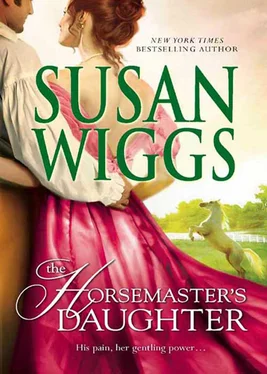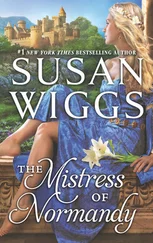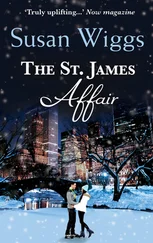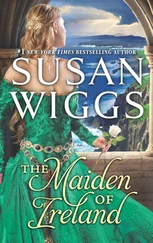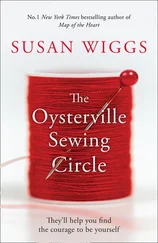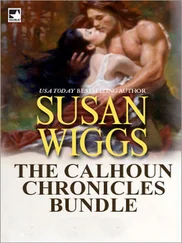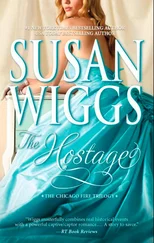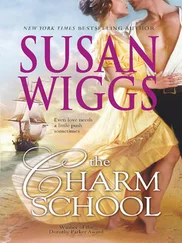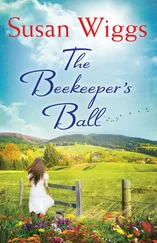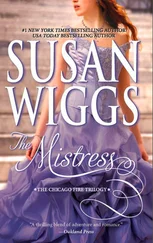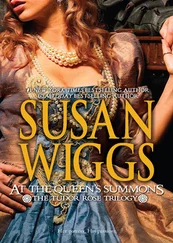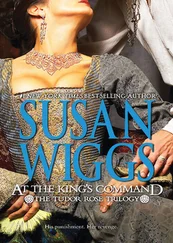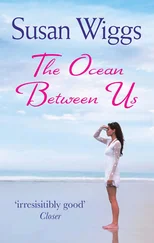Praise for the novels of
SUSAN WIGGS
“Wiggs is one of our best observers of stories of the heart. Maybe that is because she knows how to capture emotion on virtually every page of every book.”
—Salem Statesman-Journal
“The Charm School draws readers in with delightful characters, engaging dialogue, humor, emotion and sizzling sensuality.”
—Costa Mesa Sunday Times
“Will appeal to fans across the board.”
—Library Journal on The Charm School
“[A] delightful romp…With its lively prose, well-developed conflict and passionate characters, this enjoyable, poignant tale is certain to enchant.”
—Publishers Weekly on Halfway to Heaven
“A bold, humorous and poignant romance that fulfills every woman’s dreams.”
—Christina Dodd on Enchanted Afternoon
“A rare treat.”
—Amazon.com on The Firebrand, an Amazon.com Best of 2001 title
“With this final installment of Wiggs’s Chicago Fire trilogy, she has created a quiet page-turner that will hold readers spellbound as the relationships, characters and story unfold. Fans of historical romances will naturally flock to this skillfully executed trilogy, and general women’s fiction readers should find this story enchanting as well.”
—Publishers Weekly on The Firebrand
“Wiggs’s uncomplicated stories are rich with life lessons, nod-along moments and characters with whom readers can easily relate. Delightful and wise, Wiggs’s latest shines.”
—Publishers Weekly on Dockside
“Empathetic protagonists, interesting secondary characters, well-written flashbacks, and delicious recipes add depth to this touching, complex romance.”
—Library Journal on The Winter Lodge
“With the ease of a master, Wiggs introduces complicated, flesh-and-blood characters into her idyllic but identifiable small-town setting, sets in motion a refreshingly honest romance, resolves old issues and even finds room for a little mystery.”
—Publishers Weekly on The Winter Lodge (starred review)
“Wiggs explores many aspects of grief, from guilt to anger to regret, imbuing her book with the classic would’ve/could’ve/ should’ve emotions, and presenting realistic and sympathetic characters…. Another excellent title [in] her already outstanding body of work.”
—Booklist on Table for Five (starred review)
“A human and multilayered story exploring duty to both country and family.”
—Nora Roberts on The Ocean Between Us
The Horsemaster’s Daughter
The Horsemaster’s Daughter
Susan Wiggs
For Reed Alexander Brown and Jamie Gatton
Lifelong friends
With love and gratitude
And for Nicholas J. Klist
My beloved father—
I will always be “the engineer’s daughter”
Acknowledgments
Part One
Chapter One
Chapter Two
Chapter Three
Chapter Four
Chapter Five
Chapter Six
Chapter Seven
Chapter Eight
Chapter Nine
Chapter Ten
Chapter Eleven
Chapter Twelve
Chapter Thirteen
Chapter Fourteen
Chapter Fifteen
Part Two
Chapter Sixteen
Chapter Seventeen
Chapter Eighteen
Chapter Nineteen
Chapter Twenty
Chapter Twenty-One
Chapter Twenty-Two
Chapter Twenty-Three
Chapter Twenty-Four
Part Three
Chapter Twenty-Five
Chapter Twenty-Six
Chapter Twenty-Seven
Chapter Twenty-Eight
Part Four
Chapter Twenty-Nine
Chapter Thirty
Part Five
Chapter Thirty-One
Epilogue
Afterword
My thanks as always to the steadfast Joyce,
Christina, Betty and Barb; to my wonderful editors
Dianne Moggy, Amy Moore-Benson and
Martha Keenan; and to the supercharged librarian
Pat Mason, who leaves no stone (or sand dollar)
unturned in the quest for story facts. Any mistakes
are my own, but for the inclusion of such perfect
details as mating ospreys and suicidal piping plovers,
I am indebted to Pat.
The isle is full of noises,
Sounds and sweet airs, that give delight, and hurt not.
—William Shakespeare,
The Tempest, III, ii
Mockjack Bay, Virginia
April 1854
Hunter Calhoun started drinking early that day. Yet the sweet fire of the clear, sharp whiskey failed to bring on the oblivion he thirsted for. Lord above, he needed that blurred, blissful state. Needed to feel nothing for a while. Because what he felt was a lot worse than nothing.
Gazing out a window at the sluggish, glass-still waters of the bay, he noticed that the buoy was sinking and a few more planks had rotted off the dock. The plantation had no proper harbor but a decent anchorage—not that it mattered now.
“That poor Hunter Calhoun,” folks called him when they thought he was too drunk to notice. They always spoke of him with a mixture of pity and relief—pity, that the misfortune had happened to him, and relief, that it had not happened to them. In general, women thought it romantic and tragic that he’d lost his wife in such a spectacular fashion; the men were slightly disdainful and superior—they’d never let that sort of disaster befall their womenfolk.
Calhoun glared down into his whiskey glass, willing the amber liquid to numb him before he talked himself out of what he knew he must do. He experienced a strange, whimsical fantasy: the whiskey was a pool he could dive into, headfirst. If the ocean was whiskey and I was a duck, I’d swim to the bottom and never come up.
A sound of disgust from the adjoining room alerted him that he’d sung the lines of the old ditty aloud.
“Don’t go clucking your tongue at me, Miz Nancy,” he called out. “I can sing. A man has every right to sing in his own house.”
“Humph. You call that singing? I thought the neighbors’ hounds just treed a coon.” The gentle clack of her knitting needles punctuated the statement.
He finished his drink with a long swig, and oh-so-silently set his glass on the age-scarred sideboard.
“Don’t matter how quiet you try to be,” Nancy called. “I know you been at the spirits.” A moment later she stepped through the open pocket doors and came into the shabby parlor, her cane tapping along the floor until it encountered the threadbare carpet. Her African face, wizened by years she had never learned to count, held equal measures of patience and exasperation. Her eyes, clouded with blindness, seemed to peer into a deeper part of him even he didn’t see. Nancy had the uncanny ability to track his progress through a room, or worse, to track his very thoughts sometimes.
“Humph,” she said again, this time with a self-righteous snort. “How you going to shoot a gun if you all full up with Jim Hooker’s whiskey?”
Hunter gave a humorless laugh, poured another drink and gulped it down. She was the only person he knew who could actually hear a man drinking. “Drunk or sober, Nancy, have you ever known me to miss a target?”
Setting his empty glass on the smoke-stained mantel, he said, “Excuse me. I’ve got something I have to do.” He paused to fill his silver hip flask with more whiskey. Nancy waited in silence, but he felt the cold bluster of her temper as if she’d scolded him aloud.
It was too much to hope she wouldn’t follow him. He could hear the busy tap-tap of her cane as she shuffled along behind him, down the central hall toward the back of the big house. In his parents’ day, the gun room had been a hive of activity on hunt mornings, when neighbors from all over Northampton County came to call. Now the room contained only the most necessary of firearms—a Le Mats revolver, a percussion shotgun and a Winchester repeating rifle. He went to the gun cabinet and took down the Winchester, cocking open the side loading gate to make sure it was well oiled.
Читать дальше
